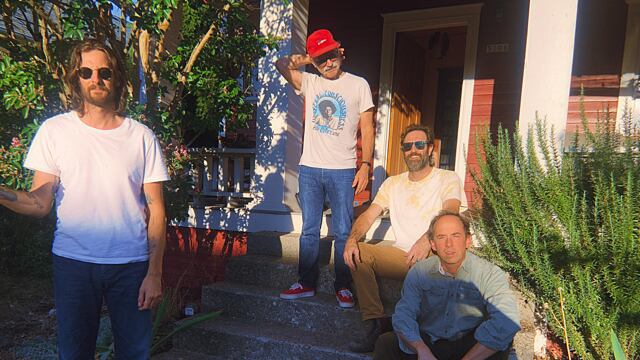Barry Walker’s steel guitar defines the sound of Portland’s cosmic country scene. Whether with local favorites Rose City Band and Jeffrey Silverstein or spacey instrumental projects like North Americans or his own Barry Walker Unit, the 44-year-old can be counted on to bring a bloom of sound to any project he blesses. Yet his first love—and the discipline that brought him to the West Coast as a grad student at Oregon State University, and now faculty member at the Washington State University School of the Environment—is geology.
At the 13th Moon Gravity Well, his debut live album with the Barry Walker Unit, was recorded on a geologically auspicious date: the anniversary of the eruption of Mount St. Helens on May 18, 1980, which coincided with two shows May 17 and 18 last year at the Southeast Portland brewery that gave the album its name.
“It’s kind of a Pacific Northwest icon,” he says of the volcano, whose surrounding landforms are the inspiration for At the 13th Moon Gravity Well’s first single, “High in the Hummocks,” available to stream in advance of the album’s digital release on July 11.
A hummock is a small aggregate hill formed in the aftermath of a volcanic landslide. Geologists only poorly understood their origin until the Mount St. Helens catastrophe, which was one of the first major volcanic events to be surveyed and studied with contemporary tools and technology.
“The volcano pretty much fell apart,” Walker says. “Volcanoes do that. And then they leave behind these big piles of material.”
“High in the Hummocks” is more sedate than this ashy genesis would imply, capping at over 10 minutes and riding a nearly unchanging chord progression all the way. This meditative approach owes a lot to Walker’s way of writing music.
“I’m out in the field a lot, so I walk a lot,” he says. “The repetitive motion of my feet hitting the ground is fodder for me to come up with these little notes and melodies.”
Yet the four tracks on the live album represent only a small selection of the music Walker and his band—guitarist Ripley Johnson, bassist Jason Willmon, and drummer John Jeffrey—performed across the two nights.
One piece used a score based on seismographs of the earthquake caused by the Mount St. Helens eruption, which Walker sourced from the U.S. Geological Survey in Vancouver, Wash. “We didn’t practice it,” Walker says. “I just showed it to them and handed it to them, and they played it.”
Inspired by the cerebral compositions of avant-garde saxophonist Anthony Braxton, this piece may find itself on a future recording, but Walker describes it as a “wall of harsh noise” in contrast to the stony and country-tinged jams on the rest of the live album. “I think that musically it might be less interesting than it is intellectually,” he says. “I don’t think it’d be an interesting record to listen to over and over again. We wanted people to be able to like the music, not just the idea.”
A “wall of harsh noise” may be truer to how most of those in the vicinity of the eruption experienced it. The deadliest and most economically costly eruption in American history, the explosion leveled homes and railways, leaving 57 people dead and decimating local wildlife populations. “The human element of the eruption in 1980 was always really disturbing,” Walker says. “We’d never really, in a modern sense, witnessed such a thing. When it blew, people didn’t really know what was going to happen.”
Yet the sulfuric front lines of an eruption aren’t necessarily the kind of thing you’d want to experience during a cozy night at the local brewery. Walker was only aware of the significance of the date after he’d already booked the show. “This wasn’t a contrived thing,” he says. “I didn’t really have the idea of the volcano connection until it was actually happening.”
Yet listening to the recordings, you’re aware not just of the convivial atmosphere of the bar, but of the great loneliness that surrounds it: the constant and violent churn of nature, which it’s hard not to feel in a city whose own volcanoes loom as a reminder of our own smallness in the implacable face of the landscape.

